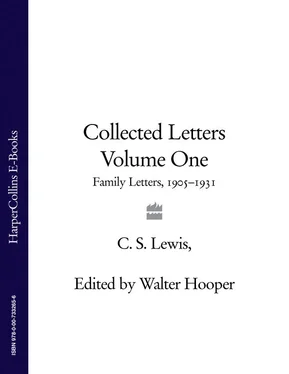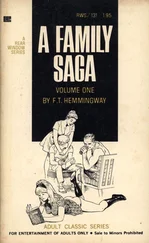So this is our public school dignity, politeness and hospitality which we are always hearing about! These are the institutions that all other civilised countries envy us for, and would imitate if they could. Bah! I for one, will be glad to be rid of them all, and would like to see the day when they are abolished. But as for this Browning, perhaps we judged him too harshly. It is very true that we never know the data for any case but our own. I hear he is not happy at home: so that, although it may be that he is such a beast that he cannot be well treated, yet on the other hand it may be that he has been made into a beast. One never knows.
Last week we had an essay on the difference between Genius and Talent, and mine has been ‘sent up for good’, the ceremony which I told you of. 21 Only three weeks more now.
your loving
son Jacks
On Saturday, 19 September 1914 Jack arrived at Great Bookham to be met at the station by the man he’d heard about all his life, W.T. Kirkpatrick. ‘I came prepared,’ he later wrote in SBJ IX,
to endure a perpetual luke-warm shower bath of sentimentality. That was the price I was ready to pay for the infinite blessedness of escaping school…One story of my father’s, in particular, gave me the most embarrassing forebodings. He had loved to tell how once at Lurgan when he was in some kind of trouble or difficulty, the Old Knock, or the dear Old Knock, had drawn him aside and there ‘quietly and naturally’ slid his arm round him and rubbed his dear old whiskers against my father’s youthful cheek and whispered a few words of comfort…And here was Bookham at last, and there was the arch-sentimentalist himself waiting to meet me…He was over six feet tall, very shabbily dressed…lean as a rake, and immensely muscular. His wrinkling face seemed to consist entirely of muscles, so far as it was visible; for he wore moustache and side whiskers with a clean-shaven chin like Emperor Franz Joseph. The whiskers, you will understand, concerned me very much at that moment. My cheek tingled in anticipation…
Apparently, however, the old man was holding his fire. We shook hands, and though his grip was like iron pincers it was not lingering. A few minutes later we were walking away from the station. ‘You are now,’ said Kirk, ‘proceeding along the principal artery between Great and Little Bookham.’ I stole a glance at him. Was this geographical exordium a heavy joke? Or was he trying to conceal his emotions? His face, however, showed only an inflexible gravity. I began to ‘make conversation in the deplorable manner which I had acquired at those evening parties and indeed found increasingly necessary to use with my father. I said I was surprised at the ‘scenery’ of Surrey; it was much ‘wilder’ than I had expected.
‘Stop!’ shouted Kirk with a suddenness that made me jump. ‘What do you mean by wildness and what grounds had you for not expecting it?’ I replied I don’t know what, still ‘making conversation. As answer after answer was torn to shreds it at last dawned upon me that he really wanted to know. He was not making conversation, nor joking, nor snubbing me; he wanted to know. I was stung into attempting a real answer. A few passes sufficed to show that I had no clear and distinct idea corresponding to the word ‘wildness’, and that, in so far as I had any idea at all, ‘wildness’ was a singularly inept word. ‘Do you not see, then,’ concluded the Great Knock, ‘that your remark was meaningless?’…By this time our acquaintance had lasted about three and a half minutes; but the tone set by this first conversation was preserved without a single break during all the years I spent at Bookham…If ever a man came near to being a purely logical entity, that man was Kirk…Some boys would not have liked it; to me it was red beef and strong beer.
TO HIS FATHER (LP IV: 212):
[Gastons,
Great Bookham,
Surrey]
Sept. 21st [1914]
My dear Papy,
I arrived, as you heard by the telegram, at Great Bookham in perfect safety and with all my effects. Today is Monday and you must excuse my not writing yesterday as some friends of Mine Host’s called in the afternoon when I had intended to do this.
Need I say how thoroughly satisfied I am with Bookham, Gastons, and their inhabitants. You already know all about Kirk–more than I do probably–and W. has spoken of Mrs. K., whom I like exceedingly.
The country is absolutely glorious. I took my first tour of exploration this afternoon, and went through the outskirts of a large forest. One was strongly reminded of ‘As you like it’. 22 The village is one such as I have often read of, but never before seen. The little row of red roofed cottages, the old inn, and the church dating from the Conquest might all have stepped out of the Vicar of Wakefield. 23 How Arthur would enjoy this place!
Another point of gratification is that I have at last, triumphantly, found a dirtier railway than the Co. Down. (I wonder have you any shares in the London & S. Western?) Kirk’s son, 24 who is in a volunteer camp near here called for an hour or so last night. We get the ‘Whig’ here, which gives a touch of home. I hope you are keeping in good health and spirits and letting Tim sleep indoors. Of course there are sewing meetings and all the usual war codotta at Bookham. To finish up–it is a brilliant success.
your loving
son Jack
P.S. Any signs of the photos? J.
TO ARTHUR GREEVES (W/LP IV: 212-13):
‘Gastons’
Grt. Bookham.
Surrey. Saturday Sept / 14 26 September 1914]
My dear Arthur,
If it were not that you could answer me with my own argument, I should upbraid you with not having written to me. See to it that you do as soon as you have read this.
And now–what do I think of it? After a week’s trial I have come to the conclusion that I am going to have the time of my life: nevertheless, much as I am enjoying the new arrangement, I feel sure that you would appreciate it even more than I. As for the country, I can hardly describe it. The wide expanse of rolling hill and dale, all thickly wooded with hazel and pine (so different from our bare and balder hills in Down) that is called Surrey, is to me, a great delight. Seen at present, in all the glory of a fine Autumn, it may be better imagined than described. How I wish that I could paint! Then I could carry home a few experiences on paper for my own remembrance and your information. But the village wd. please you even better. I have never seen anything like it outside a book. There is a quaint old inn that might have stepped out of the ‘Vicar of Wakefield’, and a church that dates from before the conquest. But it is no good enumerating things: I cannot convey the impression of perfect restfulness that this place imparts. We have all often read of places that ‘Time has forgotten’–well, Great Bookham is one of these!
I have only just discovered that you put my name in that book. 25 If I had seen it earlier I shd. have sent it back. You have no right to be so foolishly generous! However–many, many thanks. When one has set aside the rubbish that H. G. Wells always puts in, there remains a great deal of original, thoughtful and suggestive work in it. The ‘Door in the Wall’, for instance, moved me in a way I can hardly describe! How true it all is: the SEEING ONE walks out into joy and happiness unthinkable, where the dull, senseless eyes of the world see only destruction & death. ‘The Plattner Story’ & ‘Under the Knife’ are the next best: they have given me a great deal of pleasure. I am now engaged in reading ‘Sense & Sensibility’. It is, undoubtedly, one of her best. Do you remember the Palmer family? 26
In Greek, I have started to read Homer’s Iliad, 27 of which, of course, you must often have heard. Although you don’t know Greek & don’t care for poetry, I cannot resist the temptation of telling you how stirring it is. Those fine, simple, euphonious lines, as they roll on with a roar like that of the ocean, strike a chord in one’s mind that no modern literature approaches. Better or worse it may be: but different it is for certain.
Читать дальше












